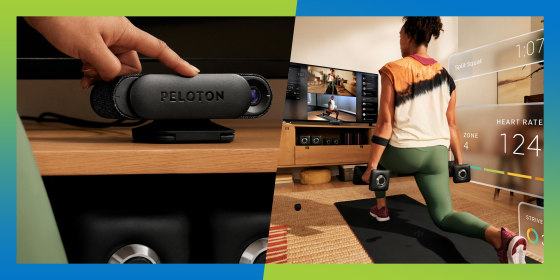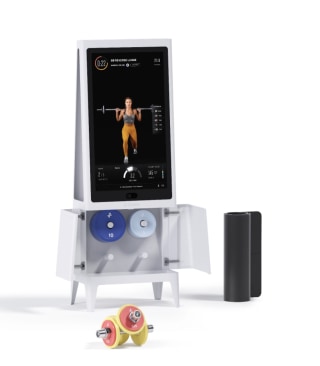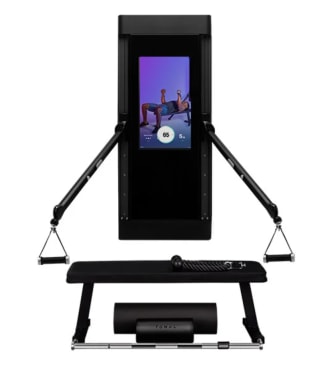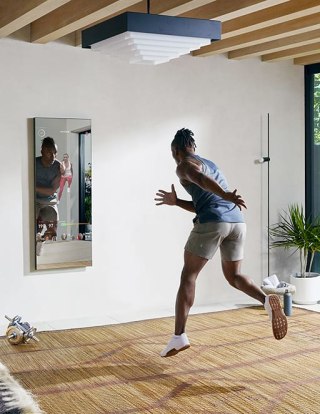Peloton announced Tuesday its first connected strength product: the Peloton Guide.
All you need is a TV to use this small AI-enabled device for guided strength training programs from home. The small machine gives users access to Peloton’s content library and instructors and uses machine learning to track users’ movements, patterns and progress. During a selected workout, the device’s built-in camera connects to the TV, and via Self Mode, you can see yourself on-screen as you exercise along with an instructor, striving to match their form.
Joining the lineup of popular at-home connected exercise devices, including Peloton’s Bike and Bike+, the Guide will be available in early 2022 in the United States. The bundle, which starts at $495 and also includes Peloton’s new Heart Rate Band (also being released next year), is the most “accessibly-priced” Peloton connected fitness product to date, according to the brand. The Peloton Heart Rate Band can also be purchased separately for $89 and is an upgrade to the chest strap heart rate monitor.
The Guide also requires a $13 monthly membership that gives up to five people per household access to Peloton’s content library, as well as the Guide’s Self Mode and Movement Tracker. Current All-Access members on the Peloton app can upgrade their membership without an additional fee.
According to the brand, the Guide gives members a virtual personal strength-training experience that’s suitable for a range of experience levels. The Guide is compatible with any weights — however, the brand does offer its own dumbbell sets for an additional cost.
The Guide’s rivals include more robust wall-mounted devices offering reflective strength training, including Lululemon’s Mirror, Amazon’s Tonal and NordicTrack’s Vault Complete and Vault Standalone. According to Peloton, strength has been its “fastest growing discipline” with almost 250,000 members across the online strength communities. Although financing plans have not been announced, Peloton is exploring options similar to the ones it currently offers for the Peloton Bike, Peloton Bike+ and Peloton Tread.
Other at-home smart gyms worth considering
If you don’t want to wait for the Guide’s release to give the gift of virtual strength training from home or to get started yourself, here are some other alternatives to opt for instead.
1. Echelon Reflect
The Echelon Reflect is a wall-mounted mirror that doubles as a workout machine. To use with its 40-inch smart mirror, Echelon offers United, its own suite of on-demand workout classes and live private fitness classes. An annual premium membership to Echelon costs $400 a year or $40 per month. When you buy the Echelon Reflect, you can sign up for a free FitPass trial to test out the classes before fully committing to the paid service.
2. Tempo Studio
This is the sole smart mirror on our list that employs artificial intelligence and 3D mapping to let you know if your stance is incorrect and offer guidance on how to best achieve the correct form. Tempo keeps tabs on your reps, advises you on when it’s time to level up your weights and creates custom fitness programs based on your performance and goals. Tempo also comes equipped with four sets of workout plates, dumbbells, a workout mat and a foam roller to aid your recovery.
Previously named the best smart gym in our guide to home gyms, this machine offers a huge selection of on-demand workouts, which it channels using an Ethernet-ready port and through a 42-inch touchscreen and 60-watt stereo speakers. A subscription to Tempo's on-demand fitness classes will run you $39 per month.
3. Tonal
Also a top pick from our previous shopping guide to home gyms, the Tonal works similarly to Tempo with a large screen that displays workouts. Unlike the other machines, though, this equipment also comes with the ability to add attachments, including cables, a bench, handles and rope, creating a full gym in a compact space. Two adjustable arms extend outward from Tonal, much like they do from an all-around cable machine at the gym. They fold in just as easily, meaning the machine won’t take up too much space.
Like Tempo, Tonal is able to monitor and track your workouts, automatically adjusting the weight and difficulty for you over time. Tonal offers a wide variety of workouts at various intensities and strength levels, including strength workouts, HIIT classes and yoga. Users can also set up multiple accounts on the same equipment, making Tonal ideal for larger households. Keep in mind classes aren’t live and attachments cost extra, which can quickly drive up the cost.
4. Mirror
Mirror was one of the first smart gym screens on the market. It’s slightly more affordable than other smart home gym models and offers many of the same digital features, including hundreds of live and on-demand classes organized by length, type and equipment needed. Like other smart home gyms, you’ll need to sign up for a subscription ($39 per month). Mirror is sleeker than other models, though, and can easily blend in as a mirror in any apartment or living space. It’s important to note that Mirror doesn’t come with any physical weights or cables — you’ll have to buy those yourself.
Catch up on Select’s in-depth coverage of personal finance, tech and tools, wellness and more, and follow us on Facebook, Instagram and Twitter to stay up to date.






